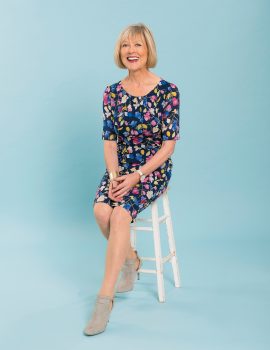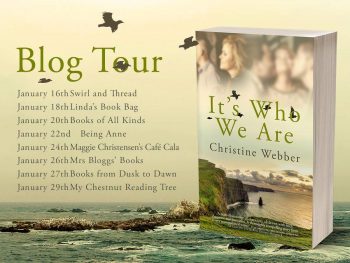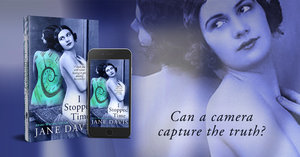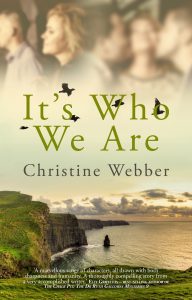Today, I’m delighted to welcome Christine Webber to Virtual Book Club, my interview series which gives authors the opportunity to pitch their novels to your book club.
Christine originally trained as an opera singer but had to re-think her career plans when her voice professor told her: ‘Your voice is OK, but your legs are very much better!’
Musical theatre beckoned. There was some success. But not much.
In 1979, she became a news presenter for Anglia TV. At last she had found something she enjoyed that other people thought she was good at. It was such a happy relief that she stayed for 12 years. Towards the end of that period, In Honour Bound, her first novel, was published.
After leaving Anglia Television, she became an agony aunt for various publications including TV Times, Best, Dare and BBC Parenting. And she wrote a relationship advice column for The Scotsman and one for Woman, called Sexplanations. She also regularly broadcast advice on Trisha, The Good Sex Guide …Late and from the BBC’s Breakfast sofa.
During her ‘problem page’ years, she decided to train as a psychotherapist. This led to her having a practice in Harley Street.
Christine has written twelve non-fiction books including How to Mend a Broken Heart and Too Young to Get Old. She has also ghosted and consulted on several celebrity books. But her intention was always to find time to return to writing fiction. In 2016, she published a novel about romance in mid-life called Who’d Have Thought It?
Although her new release (brand new, in fact), It’s Who We Are has much in common with Who’d Have Thought It? fans of Christine Webber’s writing will find this a more serious proposition, albeit one that’s reluctant to let go of the feelgood factor that is the author’s trademark.
The novel follows five fifty-somethings (a category I now find myself in), all with links to Norfolk childhoods, who, in a year of political turmoil, also undergo tremendous personal upheaval. It explores one of my personal favourite themes – identity. Without giving too much away, just as the future begins to look more certain – and in some cases positively rosy – the contents of a secret diary threaten to destabilise plans. It is a clever twist, and one I didn’t see coming.
I particularly enjoyed the characterisation and the English and Irish settings. In fact, I find myself with a strong urge to visit Ireland.
Q: Welcome, Christine. If you were trying to describe your writing to someone who hasn’t read anything by you before, what would you say?
I like to think that my writing is accessible but thoughtful. The rhythm of text dominates a lot of what hits the page – maybe because my original training was in music. I keep altering phrases until they seem to me to have the right number of syllables in them. Does the reader notice? Possibly not. But it’s all about pace and flow and I think these things are important. The other feature of my work that tends to be mentioned by critics, readers and other authors is that they enjoy the characters I create. Certainly, the people I conjure up often feel more real to me than real life! Also, I think the fact that I have been a psychotherapist for 25 years has had an impact – because I’ve been in a position to really see inside the heads of lots of people, and I’m sure this has helped me to understand how our minds work.

Photo credit: Will Ireland
Q: Was your novel inspired by any real life events? And, if so, how to do deal with the responsibility that comes with this?
I began It’s Who We Are in May 2016. But waking up to the EU Referendum result on June 24th changed everything. I simply found it impossible to write a contemporary novel without using the unprecedented political turmoil here – and later, the US presidential election result – as a significant backdrop. For one thing, Ireland became a real factor in the story, which I hadn’t envisaged when I started it. The other real life event is the landmark time so many of us experience when our parents are becoming dependent on us, or dying, and we have to clear out their houses. Many people uncover family secrets that way. And I’ve been keen to explore this idea for a while.
Q: Do you believe that you write the book you want to read?
Without question. And I think this can apply in non-fiction too. In 1999, I had qualified as a psychotherapist, and I was trying very hard to process my ideas about what constitutes happiness and how one can achieve it no matter what life throws at you. I suggested to Hodder, my publisher at that time, that I should write a book called Get the Happiness Habit. Researching that, trying out some pretty unformed ideas of my own, and then writing the book massively changed my life. I can only hope it did the same for some of my readers! Then in 2009, I really wanted to read a guide to ageing as vibrantly as possible – and in a very different way from that of our parents and grandparents. I couldn’t find anything that told me what I wanted to know, so I ended up writing Too Young to Get Old.
Q: With my own fiction, it’s often the parts in a story that are based on truth that the reader challenges as being ‘unrealistic’. Why do you think that is?
Is it just that old adage – truth is stranger than fiction? Or is that when we do write up something that genuinely happened, we in fact have less freedom than when we write about something we make up? We change people’s names. We slightly alter what happened in case we get sued! We tell a diluted version of the story because we’re worried about upsetting other people who were involved. And maybe with all that going on, we don’t write as fluently or convincingly as when we can let our imaginations run riot.
Q: Lisa Cron, in her book Wired for Story says, ‘We think in story. It’s hardwired in our brain. It’s how we make strategic sense of the otherwise overwhelming world around us.’ In what way are you trying to make sense of the world?
I feel the world has become bleaker, and less honourable and decent. In such times, we need to give and gain support from individuals who feel as we do. In particular, the strength of our friendships seems to feed our sanity, even if the turbulence and uncertainty beyond that keeps chipping it away. My story really reflects that – even though it’s not what I set out to write.
Q: Was it your intention to write a story with a message or a moral?
Not consciously. But I think that there is a strong message in It’s Who We Are, which is that it’s vital to reach out for what enhances rather than depletes you – and that kindness and friendship are everything.
Q: William Boyd plots for a year before he puts pen to paper. Maggie O’Farrell writes with a desire to explore an issue and understand how it could happen. She says that she ‘trusts the novel to know more than she does. Which are you, or do you fall somewhere in between?
I’m a bit of both. Certainly, I allow an idea to ferment for quite a while before I write. Having said that, now that I’ve abandoned various other aspects of my career in order to focus on fiction – and am therefore writing much more – I’ve become more inclined to start with the barest framework and just see what happens. In It’s Who We Are, lots of things happened – characters changed careers, had accidents, fell in love, etc. – that only took place because the ‘novel knew more than I did’. That’s a great Maggie O’Farrell phrase and it feels like the best possible way to describe how a book can have a mind of its own.
Q: Writing is undoubtedly a lonely occupation. P D James says that it is essential for writers to enjoy their own company. Are you a natural loner?
I am. I suspect I give the impression of being very sociable and gregarious. But I have a seriously quiet and contained side. And I feel deeply unsettled if I don’t get enough solitude or space.

Book signing at Jarrold Department Store, Norwich
Q: Hilary Mantel says that a Catholic upbringing is the only qualification a writer requires. Do you have any writing qualifications?
Well, I can’t claim to have that one! Though, as it happens, I am a Catholic now – which is probably why I made one of my characters a priest. As to my own ‘qualifications’, as a child I longed for more stimulus, a different location and bags more exposure to culture and knowledge. So, I think I used my imagination to create what I would want and need later. And maybe that’s what is necessary for a writer – an ability to be somewhere entirely different in one’s mind.
Q: Have you experimented with audio books yet, and, if so, what was your experience of them?
Around the middle of 2017, I kept reading how there was a boom in audio books. This was something completely out of my own experience, but I began to take notice. Also, I heard a very good podcast with Joanna Penn and science fiction writer J Daniel Sawyer – and through that I learned that nowadays many readers expect to have any new title available to them in a number of formats. So, I decided to dip my toe in the water and have a go. Then I opted to go the whole hog and produce an Audio CD version as well as a digital one. In a nutshell, I found a narrator in actor Julie Peasgood, who has done a wonderful job with my novel. I picked Red Apple Creative to record and produce the book and a company called Goldings to do the final production of CD cases, covers etc.
As for the download, I went with ACX in the end, the non-exclusive deal. Which basically means I get 25% of the purchase price rather than 40% but I think this was the right decision for me as I am toying with going to Author’s Republic too in the hope of greater exposure. I am feeling my way with this format, as indeed I think most British authors are – especially indie ones. I think our American counterparts are months, if not years, ahead of us in this respect.
The audio book has been out for less than two months and it’s going to be ages before I make back the money I’ve spent. It’s a long-term project! But I can tell you that the CD version is doing better in the book shops who stock it than it’s doing on Amazon. And that the audio download version is more popular at present in America than it is here. Both of these facts are quite surprising to me.
Q: I just stumbled across this in an article by Adam Haslett. ‘A psychiatrist friend once pointed out to me that one of the definitions of psychosis is a fixed belief in an imaginary world lasting months or years, which no one but the patient himself is able to perceive. He wondered aloud if this wasn’t also a decent definition of a novelist.’ You seem well qualified to comment. Do you think he has a point?
Absolutely!
Want to find out more about Christine and her writing?
Try this ‘get to know you’ interview with Christine over at Jill’s Book Cafe .
Follow her blog tour!

Visit her website or follow her on Twitter: @1chriswebber
Facebook: Christine is active in various Facebook groups including ALLi, Books for Older Readers and Book Connectors.
Remember, if you enjoyed this post please share it. If there’s anything else you’d like to ask Christine please leave a comment.
To have future posts delivered directly to your in-box, visit the sidebar on the right and subscribe to my blog, or to find out about new releases, competitions and freebies, subscribe to my newsletter and grab your free copy of my novel, I Stopped Time.



